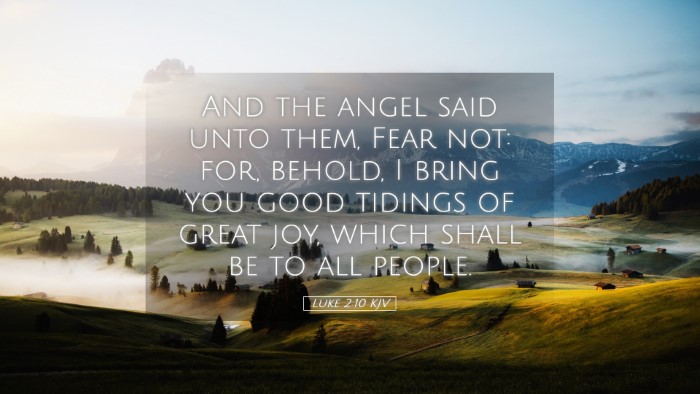Commentary on Luke 2:10
Verse: “But the angel said to them, 'Do not be afraid; for behold, I bring you good tidings of great joy which will be to all people.'”
Introduction
This proclamation by the angel heralds the birth of Christ, marking the commencement of a transformative period in human history. The message encapsulates the essence of the Gospel, heralding joy not only for the shepherds but for all people. Significant insights can be derived from esteemed public domain commentaries, each offering a unique perspective on the theological and historical implications of this verse.
Analysis of the Key Phrases
- “Do not be afraid”:
This phrase addresses the instinctive fear that often accompanies divine encounters. The angel’s reassurance represents God's desire to quell fear in the hearts of humanity, emphasizing that the message is not one of judgment but of grace. Matthew Henry notes that fear is a natural response to the supernatural, yet the responder, in this case, offers assurance of peace.
- “Good tidings”:
In Greek, this is often translated as "evangelion," or gospel. Albert Barnes stresses the importance of this announcement, characterizing it as the beginning of the fulfillment of messianic prophecies and a promise of hope that transcends mere earthly concerns.
- “Great joy”:
This joy is not trivial but profound and life-changing, as noted by Adam Clarke, who elaborates that joy is an intrinsic outcome of receiving the good news of salvation. It's a joy that invites all to partake in the transformative nature of Christ's mission.
- “To all people”:
This phrase signifies the universal scope of the Gospel. It emphasizes the inclusivity of Christ's message, breaking barriers of race, nationality, and social status. Henry highlights the fact that the coming of Christ is intended for every human being, reinforcing the concept of universal salvation.
Theological Implications
The proclamation of Jesus’ birth intersects with themes of grace, joy, and salvation. The angel’s declaration serves as a precursor to understanding the broader mission of Christ, as introduced in the Gospels. Matthew Henry interprets this moment as a divine revelation where heaven meets earth, cheering the shepherds' hearts and signaling the fulfillment of Old Testament prophecies regarding the Messiah.
Pastoral Applications
For pastors, this verse serves as a reminder to communicate a message of hope and joy in their ministry. The words of the angel compel believers to shed fear and embrace the joyous reality of Christ's nativity. In a world rife with anxiety, the shepherds' encounter provides a model for pastoral care that emphasizes reassurance and joy in the face of hardship.
Practical Steps for Students and Theologians
- Contextual Study:
Understanding the historical and cultural context surrounding Luke’s Gospel enhances the richness of this verse. Engage with commentaries to explore the significance of shepherds in the First Century and their response to divine revelation.
- Examination of Joy:
Delve deeper into the theme of joy throughout Scripture, correlating various biblical instances where joy is central to a believer's experience. In addition, consider how this joy manifests in the life of individuals and communities today.
- Universal Salvation:
Explore the implications of the Gospel’s universal call. Consider how the verse challenges and encourages modern-day evangelism and outreach efforts, calling for inclusivity and acceptance based on the example set by the angel.
Conclusion
Luke 2:10 stands as a cornerstone in the narrative of the Gospel, encapsulating the core message of Jesus' coming. It serves to remind the faithful of the joy and hope found in Christ, a clarion call to dispel fear and embrace the transformative message intended for all humanity. In drawing from the insights of Matthew Henry, Albert Barnes, and Adam Clarke, we find a multi-faceted understanding of the depth of this proclamation, inspiring both personal reflection and communal worship.


